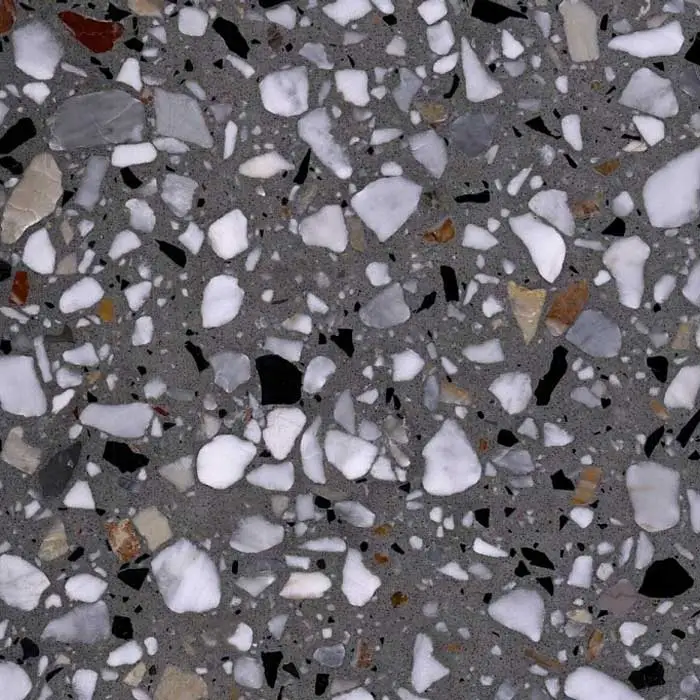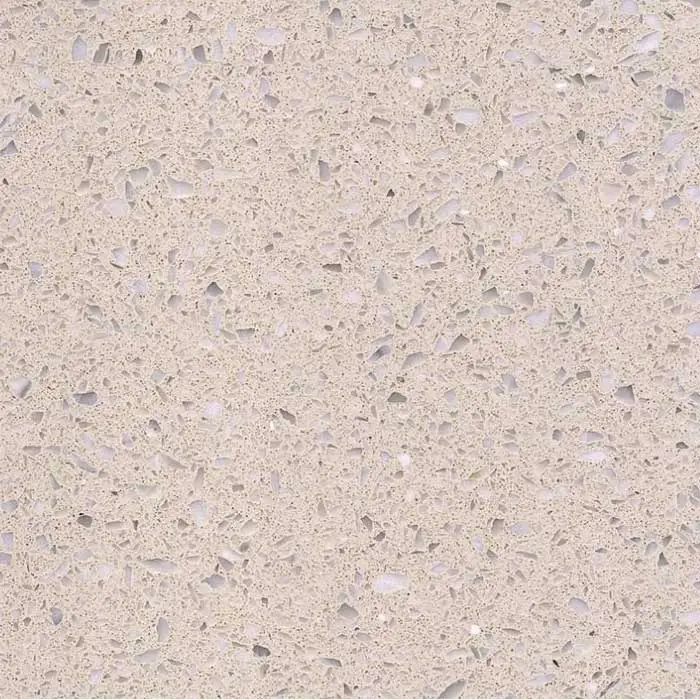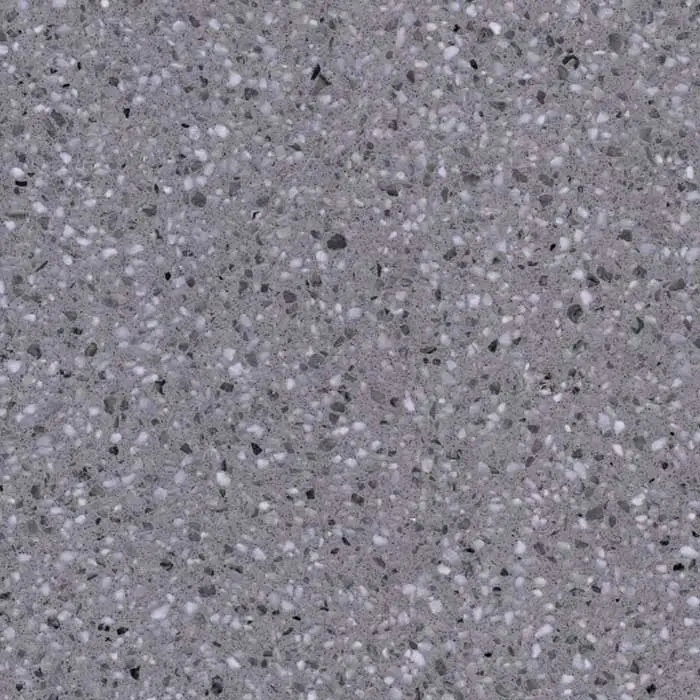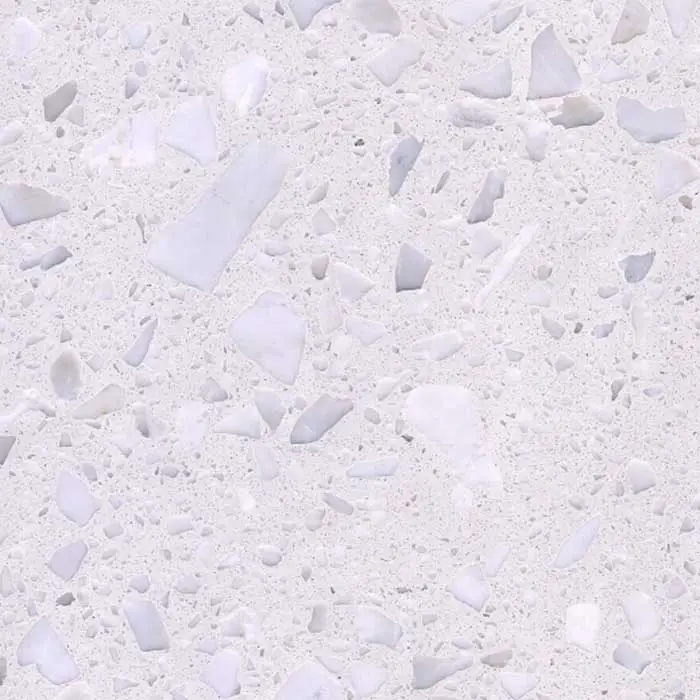As a high-frequency use area in the home, the kitchen is an important place for cooking, washing and storage. Therefore, the kitchen floor should not only be beautiful, but also have multiple functions such as durability, easy cleaning, non-slip and moisture-proof. When choosing a kitchen floor, it is crucial to consider the durability, comfort and waterproof performance of the material. In recent years, terrazzo stone flooring has gradually become a popular choice for kitchen floors due to its unique appearance and excellent performance.
So, what type of flooring is best for the kitchen? Is terrazzo stone flooring a suitable choice? This article will answer these questions in detail.

What are the requirements for kitchen floors?
Before discussing the specific floor types, we must first clarify the basic requirements for kitchen floors. The kitchen is a high-humidity, high-usage environment, and the flooring materials must be able to cope with the challenges of oil stains, water stains and various dirt. Therefore, the kitchen floor needs to meet the following conditions:
1. Water resistance: The kitchen floor must have good waterproof performance to prevent water stains from penetrating into the interior of the floor and causing structural damage. Since the kitchen is a high-humidity environment, the flooring material must be able to resist long-term moisture erosion.
2. Easy to clean: Kitchen floors are often exposed to food residues, oil stains, etc., so they must be easy to clean and resist the invasion of various stains. The ideal floor material should not absorb dirt easily, have a smooth surface and be easy to maintain.
3. Durability: The kitchen is one of the busiest areas in the home, and the floor needs to be able to withstand the impact of heavy objects, the movement of furniture, and high-frequency trampling. Therefore, wear resistance and impact resistance are key factors in the selection of kitchen floors.
4. Anti-slip: Since there are often water and oil stains on the kitchen floor, the anti-slip performance of the floor directly affects the safety of the user. High-quality kitchen floors should have a certain anti-slip coefficient to avoid accidents caused by slipping.
5. Aesthetics: The kitchen is an important part of the family, and the color, texture and design style of the floor should be coordinated with the overall decoration style. Therefore, the decorativeness of the floor should also be taken into consideration.

What are the common types of kitchen floors?
Based on the above basic requirements, there are many options for the selection of kitchen floors, and different floor materials have their own characteristics in terms of aesthetics, durability and practicality. Below we list several common kitchen floor materials and analyze their advantages and disadvantages.
Ceramic floor tiles
Ceramic floor tiles are one of the traditional choices for kitchen floors and are popular for their excellent waterproofness and durability.
Advantages of ceramic floor tiles:
● Durable and extremely waterproof, they can resist moisture and water stains in the kitchen environment for a long time.
● Easy to clean, the surface is not easy to absorb oil or food residues, and daily maintenance is simple.
● A variety of patterns and colors are available to match various decoration styles.
Disadvantages of ceramic floor tiles:
● The surface is relatively hard, and standing for a long time may cause leg fatigue.
● It feels cold in winter, which may affect comfort.
● Poor anti-slip performance, especially when there are water stains.
Vinyl flooring (PVC flooring)
Vinyl flooring has become a popular kitchen flooring material in recent years because of its relatively low price, simple installation, and wide variety.
Advantages of vinyl flooring (PVC flooring):
● Good waterproof performance, suitable for humid kitchen environments
● It has a certain cushioning property and is comfortable to stand on, suitable for kitchens where people stand for a long time.
● It is low-priced and has a wide variety of styles, and can imitate a variety of appearances such as wooden floors and tiles.
Disadvantages of vinyl flooring (PVC flooring):
● Compared with other materials, it is less durable and easily scratched or punctured by sharp objects.
● Long-term use may cause problems such as fading or warping.
Hardwood flooring
Hardwood flooring is often used in various rooms of the home with its natural texture and warm touch, and has gradually entered kitchen design in recent years.
Advantages of hardwood flooring:
● Beautiful and natural, it improves the overall texture and decoration level of the kitchen.
● It feels warm and comfortable to the touch, especially suitable for areas with cold winters.
Disadvantages of hardwood flooring:
● Poor waterproofness, long-term contact with water stains may cause the wood board to deform, swell or rot.
● Regular maintenance and waxing are required, and the maintenance cost is high.
Terrazzo stone flooring
Terrazzo stone flooring, as a composite material, is made of a mixture of cement, quartz sand, marble particles and other materials, and has become popular again in recent years. Because of its durability and flexible design, it is favored by many decoration designers. So, is terrazzo stone flooring suitable for kitchens? Next, we will focus on analyzing the advantages and disadvantages of terrazzo stone flooring.

What are the advantages and disadvantages of terrazzo stone flooring?
Advantages of terrazzo stone flooring
● Extremely durable: Terrazzo stone flooring has extremely high durability due to the characteristics of its material composition. Its hardness is close to that of natural stone, and it can effectively resist high-frequency trampling, impact of heavy objects, and common scratches in daily kitchens. Compared with vinyl or wooden floors, terrazzo has a long service life and is not easy to wear or crack, which is very suitable for frequently used areas such as kitchens.
● Excellent waterproof performance: The kitchen floor often needs to face splashing water and oil stains. The high-density structure of terrazzo stone flooring makes it have good waterproof performance. It hardly absorbs water and can effectively prevent moisture from penetrating into the floor structure, avoiding mold or corrosion problems caused by moisture. In addition, the surface of terrazzo is smooth, dirt is not easy to penetrate, and daily cleaning is very convenient.
● Easy to clean and maintain: The surface of terrazzo stone flooring is very smooth after polishing, which makes it difficult for stains, oil stains and other substances to adhere to the floor. Daily cleaning only requires a simple mop, and even some stubborn stains can be easily removed. For areas that are easy to get dirty, terrazzo stone flooring can greatly reduce the workload of daily care.
● Good anti-slip performance: Although the surface of terrazzo stone flooring is smooth, it can have good anti-slip performance after special treatment. Many terrazzo stone flooring manufacturers will add an anti-slip coating to the surface to ensure that even when the ground is slippery, it can provide sufficient friction to avoid slipping accidents.
● Diverse aesthetic choices: The design of terrazzo stone flooring is extremely flexible. Different colors, particle sizes and arrangements can be selected according to the owner's preferences to create a variety of patterns and styles. From simple modern style to retro traditional style, terrazzo stone flooring can be well integrated to add a unique artistic atmosphere to the kitchen.
Disadvantages of terrazzo stone flooring
● Complex construction: The laying process of terrazzo stone flooring is relatively complicated, and it needs to go through multiple processes such as modulation, pouring, grinding, and polishing. Compared with other materials, terrazzo stone flooring has a higher installation cost and a longer construction period. This means that if the budget is limited or time is tight, terrazzo stone flooring may not be the best choice.
● Cold touch: Although terrazzo stone flooring has excellent performance, the characteristics of its material determine that it feels cold. Especially in the cold winter, terrazzo stone flooring may make people feel uncomfortable. Therefore, if you choose terrazzo stone flooring, it is recommended to install a floor heating system under the floor to increase the comfort of winter use.
● Heavy weight: Terrazzo stone flooring is heavy, and there are certain requirements for the bearing capacity of the ground during installation. If the kitchen's basic structure is relatively weak, additional reinforcement work may be required before construction.

Is terrazzo stone flooring suitable for the kitchen?
On the whole, terrazzo stone flooring is undoubtedly an excellent choice for kitchen flooring. Its durability, waterproofness, anti-slip and easy cleaning fully meet the basic requirements of kitchen floors and can provide excellent performance in daily use. Especially in modern home decoration, the diverse design options of terrazzo stone flooring can add unique aesthetic value to the kitchen space.
However, when choosing terrazzo stone flooring, some practical issues also need to be considered. The first is the construction cost and time. If the budget is tight or the construction period is limited, terrazzo stone flooring may not be the best solution. Secondly, terrazzo stone flooring feels cold, especially in cold seasons, which may affect comfort. Users need to weigh the relationship between comfort and functionality.
Other flooring materials suitable for kitchens
In addition to terrazzo stone flooring, common flooring materials in the kitchen include ceramic tiles, vinyl floors, and hardwood floors. Each material has its own unique advantages and applicable scenarios, so users can compare them according to actual needs when choosing.
● Ceramic floor tiles: If you focus on waterproofness and durability, and the budget is relatively loose, ceramic floor tiles are a very suitable choice. It can cope with the high humidity environment of the kitchen and has low maintenance costs.
● Vinyl flooring: For users who want to reduce their budget and pay attention to the convenience of installation, vinyl flooring is a good choice. Although it is slightly less durable, its waterproof performance and easy cleaning can still meet the basic needs of the kitchen.
● Hardwood flooring: If the decoration style of the kitchen needs to be consistent with that of other areas, hardwood flooring is also an option. However, due to its poor waterproof performance, special attention should be paid to daily maintenance when choosing it.

